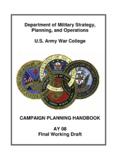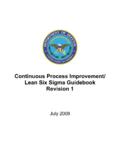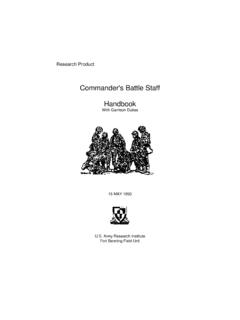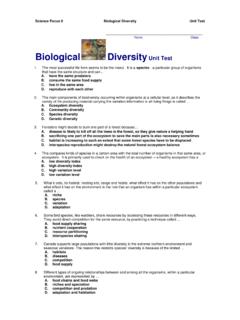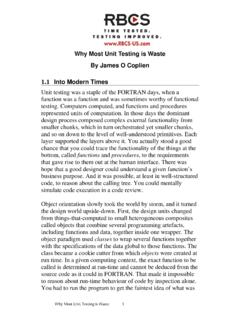Transcription of UNIT 1: INTRODUCTION TO ICS INTRODUCTION …
1 unit 1: INTRODUCTION TO ICS. INTRODUCTION TO THE INCIDENT COMMAND SYSTEM. PURPOSE AND SCOPE OBJECTIVES. This unit will introduce you to and define ICS. After completing this unit you should be able to: The unit will provide you with a brief history of ICS and its evolution into an effective system for Define ICS. emergency management. The unit also will in- Identify the main ICS functions and their troduce the ICS organization and describe each ICS function and its responsibilities during an responsibilities during an incident. incident. This unit will include the key concepts Identify the key concepts and principles of and principles of ICS and introduce important ICS.
2 Terms that you will need to know to function in an Describe the advantages of using ICS as an ICS structure. organized approach to the management of This unit will form the foundation for the re- emergency incidents. mainder of this Independent Study and the Describe where you might be assigned within courses that follow. Because many of the terms, an ICS structure and list possible job respon- concepts, and principles presented in this unit sibilities. will be new to you, be sure to spend enough time on this unit to ensure that you thoroughly under- stand the material. When you complete the unit , TIME. test your understanding of the material by com- pleting the Self-Check Exercise that follows the Completion of this unit should take approxi- unit .
3 If you cannot answer all of the questions mately 2 hours. correctly, review the appropriate section(s) of this unit before proceeding to unit 2. Basic Incident Command System (ICS) ) Independent Study Page 1-1. unit 1: INTRODUCTION TO ICS. WHAT IS ICS? Fires. Incidents involving multiple casualties. ICS is the model tool for command, control, and coordination of a response and provides a means Multijurisdictional and multiagency inci- to coordinate the efforts of individual agencies as dents. they work toward the common goal of stabilizing Air, rail, water, or ground transportation ac- the incident and protecting life, property, and the cidents.
4 Environment. ICS uses principles that have been proven to improve efficiency and effectiveness in Wide-area search and rescue missions. a business setting and applies the principles to Pest eradication programs. emergency response. Private sector emergency management pro- Why do you need to know about ICS? We live in grams. a complex world in which responding to emer- gencies, from single-car accidents to large-scale Federal law requires the use of ICS for response disasters, often requires cooperation among sev- to HazMat incidents. Many States are adopting eral agencies. In an emergency, you and other ICS as their standard for responding to all types personnel from your agency may be called upon of incidents.
5 ICS has been endorsed by the to help with the response. Given the current American Public Works Association and the In- movement toward using an ICS structure for ternational Association of Chiefs of Police and emergency response, it is likely, therefore, that has been adopted by the National Fire Academy you will function in an ICS environment. In an as its standard for incident response. ICS is in- emergency, you may not be working for your cluded in the National Fire Protection Associa- day-to-day supervisor, or you may be working in tion (NFPA) Recommended Practice for Disas- a different location. Thus, emergency response ter Management (NFPA1600).
6 ICS is also part operations are not business as usual. of the National Interagency Incident Management System (NIIMS). This unit will provide you with information that you will need to work in an ICS environment, including the rationale for using ICS and how ICS History ICS can be used to manage all types of incidents. It also will describe the basic ICS organization, ICS was developed in the 1970s in response to a how ICS can form the basis for an effective series of major wildland fires in southern Cali- emergency management system, and how ICS fornia. At that time, municipal, county, State, can enhance EOC operations.
7 And Federal fire authorities collaborated to form the Firefighting Resources of California Organ- ized for Potential Emergencies (FIRESCOPE). When Is ICS Used? FIRESCOPE identified several recurring prob- lems involving multiagency responses, such as: ICS has been proven effective for responding to all types of incidents, including: Nonstandard terminology among respond- ing agencies. Hazardous materials (HazMat) incidents. Lack of capability to expand and contract Planned events ( , celebrations, parades, as required by the situation. concerts, official visits, etc.). Nonstandard and nonintegrated communi- Response to natural hazards.
8 Cations. Single and multiagency law enforcement in- Lack of consolidated action plans. cidents. Lack of designated facilities. Lack of comprehensive resource manage- ment strategy. Page 1-2 Basic Incident Command System (ICS) Independent Study unit 1: INTRODUCTION TO ICS. ICS History (Continued) ICS ORGANIZATION. Efforts to address these difficulties resulted in the Many incidents whether major accidents (such development of the original ICS model for effec- as HazMat spills), minor incidents (such as tive incident management. Although originally house fires and utility outages), or emergencies developed in response to wildfires, ICS has and major disasters (such as tornadoes, hurri- evolved into an all-risk system that is appropriate canes, and earthquakes) require a response for all types of fire and nonfire emergencies.
9 From a number of different agencies. Regardless Much of the success of ICS has resulted directly of the size of the incident or the number of agen- from applying: cies involved in the response, all incidents require a coordinated effort to ensure an effective re- A common organizational structure. sponse and the efficient, safe use of resources. Key management principles in a standardized To understand this concept better, review the way. examples of incidents that are included on the next page and record the agencies that probably The remainder of this unit will introduce these would be involved in each incident and the re- concepts and principles.
10 Sources that each agency would offer. Basic Incident Command System (ICS) ) Independent Study Page 1-3. unit 1: INTRODUCTION TO ICS. ICS ORGANIZATION (Continued). Example 1: A multicar traffic accident has occurred, in which two people have been injured. There is potential damage to a bridge abutment. Potential Response Agencies: Potential Resources: Example 2: A water main break has disrupted all major utilities. The break has caused local flooding of a major road and several local businesses. Potential Response Agencies: Potential Resources: Page 1-4 Basic Incident Command System (ICS) Independent Study unit 1: INTRODUCTION TO ICS.

